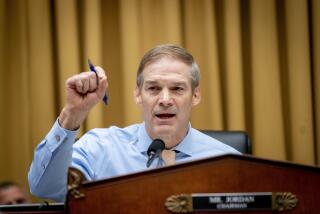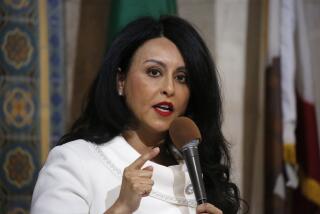GOP Fanning Doubts on Clinton
- Share via
WASHINGTON — Although Republicans have steadfastly refrained from directly commenting on the sexual allegations against President Clinton, some have begun invoking unrelated issues in a bid to fan public doubts about Clinton’s repeated denials.
The emerging GOP tactic, at least for now, is cloaked in genuine policy disputes over taxes and the budget deficit. But several Republican strategists on Thursday acknowledged their hope that the attacks on Clinton’s credibility over these substantive matters will also erode the public’s acceptance of his claim that he did not have a sexual relationship with former White House intern Monica S. Lewinsky and then later urge her to lie about it.
“The private Clinton and the public Clinton are inseparable,” said one top Senate GOP tactician, who asked to remain anonymous. “Republicans naturally want to make certain the American people get that message.”
On Capitol Hill Thursday, for instance, Jack Kemp, the GOP vice presidential nominee in 1996, accused Clinton of “deceiving the American people” by “using wily half-truths.” Only Kemp was taking issue with Clinton’s claim that the middle-class tax burden is at a 20-year low.
Sen. Connie Mack (R-Fla.) took a different tack in questioning policy initiatives the president promoted in his State of the Union speech Tuesday night. Recalling that Clinton proclaimed in his 1996 address to Congress that “the era of big government is over,” Mack said: “Now he is proposing this staggering list of new, big-government spending programs. So how can we believe him? There’s a real question of credibility here.”
Although Clinton’s spending plan will not be released until next week, the GOP’s budget leaders in Congress, Sen. Pete V. Domenici of New Mexico and Rep. John R. Kasich of Ohio, are estimating that the programs the president proposes could cost as much as $50 billion. And they question Clinton’s claim that he can pay for those initiatives without curtailing existing programs or raising taxes.
For the record, Republicans insisted Thursday that their growing focus on Clinton’s credibility is simply a coincidental, if happy, byproduct of an ongoing philosophical debate over public policy.
“I think you can make the case that this is related, but it certainly is not in our minds to do that,” said Rep. John T. Doolittle (R-Rocklin).
In attacking Clinton’s credibility over economic issues, Republicans may face a credibility challenge.
After all, not one Republican voted for the president’s 1993 economic plan, and at the time party leaders predicted it would cause widespread job loss and ever greater deficits.
Instead, the opposite happened, with the economy posting strong numbers and the deficit melting away.
“So you have a credibility problem on both sides of the aisle,” said Roger H. Davidson, University of Maryland professor of government and politics.
“But it’s understandable that the Republicans would use this ammunition to make their point. It’s certainly to their advantage to put further doubt in people’s minds about Clinton’s credibility.”
The GOP tactic is beginning to rankle Democrats.
“It’s very clear that, although they want it to appear that they are not trying to use the allegations against the president, they are in fact very discreetly and subtly raising the issue--through the use of language at every chance,” Rep. Jim McDermott (D-Wash.) said.
Clinton seems vulnerable to many when it comes to credibility, having developed a reputation of carefully parsing his words in ways frequently interpreted as an effort to evade or mislead. Even many congressional Democrats, including some longtime Clinton allies, privately acknowledge that they do not fully trust him.
“If you ask the American people, and politicians know this, what they like the least about Bill Clinton, they will say it’s his character--his tendency to be not truthful. They doubt his word. They don’t trust him,” said one Senate GOP aide. “And that needs to be reinforced.”
Doolittle put it this way: “Bill Clinton portrays himself as someone who is other than what he seems--he’s a big spender, a big-government guy. Yet he uses the language of the Republicans.”
More to Read
Get the L.A. Times Politics newsletter
Deeply reported insights into legislation, politics and policy from Sacramento, Washington and beyond. In your inbox twice per week.
You may occasionally receive promotional content from the Los Angeles Times.










